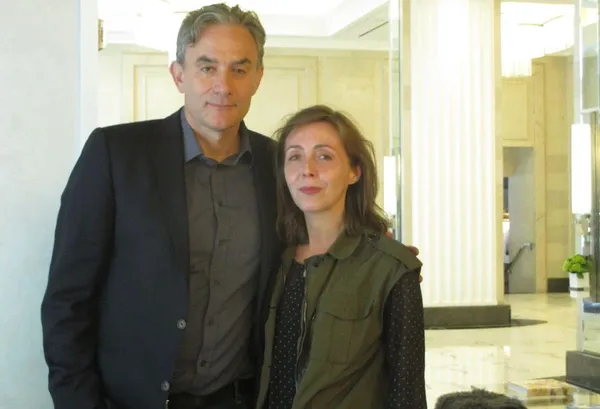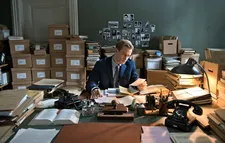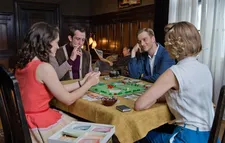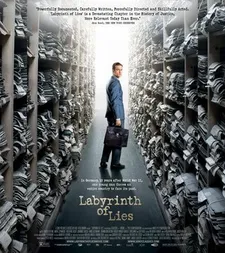 |
| Labyrinth Of Lies director Giulio Ricciarelli with Anne-Katrin Titze Photo: Aimee Morris |
I met up with the director of Germany's Oscar submission, Labyrinth Of Lies (Im Labyrinth Des Schweigens), Giulio Ricciarelli, at the Loews Regency Hotel on Park Avenue, where I previously engaged Jane Pollard and Iain Forsyth on working with Nick Cave, plus Juliano Ribeiro Salgado and Wim Wenders on The Salt Of The Earth earlier this year. Chet Baker's music was playing in the lobby, reminding me of Bruce Weber's Let's Get Lost, upon entering the labyrinth to discuss Ricciarelli's impressive debut feature. It stars Alexander Fehling of Inglourious Basterds fame, with Johannes Krisch (Finsterworld, Revanche), André Szymanski, Friederike Becht, Johann von Bülow and Mathis Reinhardt, and is dedicated to the late great stage actor, Gert Voss, who is spectacular as the unsung real-life hero State Attorney General Fritz Bauer.
 |
| Alexander Fehling as Johann Radmann |
Claude Lanzmann's brilliant The Last Of The Unjust, Alfred Hitchcock's The 39 Steps and Hal Ashby's Harold And Maude show us how to reveal. Ricciarelli captures a mood of revitalisation, with mid-century architecture, punch bowl parties and La Strada posters on the wall, as well as the period's casual sexism. One by one, the characters' past is revealed - after all, everybody was somewhere during the war.
Labyrinth Of Lies focuses on a point in time, when looking forward for many meant ignoring the mass grave in the backyard. Frankfurt, 1958. School lets out. A teacher offers to give a light to a man walking by the schoolyard. The man with the lighter misses a finger. The passerby freezes in recognition. This is how the story centered around Johann Radmann (Fehling) a young prosecutor whose investigations lead to the 1963-1965 Frankfurt Auschwitz Trials begins. Radmann is a composite of three actual prosecutors, one of them, Gerhard Wiese, consulted on the film. How much did "regular Germans" know about Auschwitz in the late 1950s? Could the SS guard at the camp be hiding in plain view, enjoying a career in public service or perhaps be a local baker? How is it possible that Josef Mengele made several trips back to Germany from Argentina and was never arrested?
Anne-Katrin Titze: First of all, congratulations for being the German submission for the Foreign Language Oscars. It's your first feature film?
 |
| Major Parker (Tim Williams) instructs Radmann |
Giulio Ricciarelli: It's my first feature film, yes. I'm quite happy, quite thrilled, of course. It sold widely in many countries, but this gives it another push and I'm very happy about that.
AKT: I want to start with the first scene at the schoolyard. Somebody, presumably a teacher, gives a passerby a light. And then there is a moment of recognition while the children are heard singing Kein Schöner Land. Often these scenes are placed later in films. I am thinking of Hitchcock's The 39 Steps, when we go, ah, the finger is missing. Or in Harold And Maude the number on the arm. Did you have that scene always at the beginning?
GR: Yes. We had different ideas for that first scene but that was important. Because that was the reality of these times. You had survivors and you had perpetrators and they were living. Scenes like that actually happened. People walking into a pharmacy and suddenly recognising somebody who had tortured them in Auschwitz. At the same time, of course, the school and the innocence, that was, I think, the right choice. You have the small children, you have the teachers, kind of a beautiful harmony, then you suddenly realise, there's something huge in there and you're shocked. That kind of brings people into the story.
AKT: What surprised me very much is the following. That somebody born in 1930, who was a lawyer, at the beginning of your movie, in 1958, was not aware of the meaning of Auschwitz. Where did the research on this come from? I was doubting that you were accurate about that. What about Denazification? What about the information out there? How did you research that this was plausible for someone who was educated not to know?
 |
| Marlene Wondrak (Friederike Becht), Thomas Gnielka (André Szymanski), Johann Radmann and Inge Gnielka (Lisa Martinek) at Monopoly |
GR: First of all, I had the same reaction you had when I got in touch with the story. Elisabeth Bartel whom I wrote the script with, she read an article and she came to me and I started doing research and I said, "It's not possible." That was my reaction. And that's the paradox of the film because we worked very closely with historians. We paint a very precise picture of that time. That's the reason to make the film and at the same time, that's the hardest thing to make believable. That's why we have a classical exposition. We worked with historians and I did speak with Gerhard Wiese who was the third prosecutor [at the Frankfurt Auschwitz Trials].
He was basically as old as our character. I asked him, "how did you know about Auschwitz?" And he told me, he had never heard of camps, he was living in the countryside, he was drafted into the war, then he became a Russian prisoner. He said, in '46 there was once an article on the blackboard about camps. What the German prisoners always immediately said, was "oh, that's propaganda." That's important to understand the story, that the Nazis worked so much with propaganda, it was easy to install mistrust in anything a government tells you. The Nazis even shot a film at Theresienstadt where it said "The Führer gives the Jews a new city." Total propaganda movie.
AKT: This is a big part in Claude Lanzmann's The Last Of The Unjust, which is fantastic.
GR: Yes, it's a fantastic film. So Wiese read this article, he was 17 years old. He forgot all about it.
AKT: He was one of the role models for Radmann [Alexander Fehling], your main character? He is a composite, right?
 |
| Labyrinth Of Lies US poster |
GR: He is a composite, exactly. He was a young prosecutor, the third one assigned to the first trial. Gerhard Wiese is still alive. He is 87. So [after the imprisonment] he went home, he became a lawyer. In 1962 he was assigned to this trial and they gave him a little book by [Rudolf] Höss. He was a commander and he was tried by the Polish and he had written memoirs and they said, "read up on what happened there." In 1962, a lawyer, a very educated man. So that is a reality of knowledge. The Nuremberg Trials were very much perceived in Germany as the winning party putting on trial the losing party after the war.
There was a lot of information being passed by the Americans right after the war but there was a young generation being brought up in a code of silence. I did a lot of Q&As in Germany and literally hundreds of people told me this. Four weeks ago, there was a woman, she was around 25 in the States in the late 1950s and survivors would come to her and show her the numbers or say, look, I have no hair and they would lift their wigs, and she didn't know what had happened and went back home and confronted her father and he only said, "Child, you wouldn't understand." So we are painting a very precise picture of Germany at the time. There are people like the journalist who talks about it. It's not that nobody knew. There is this library scene and I had the original library cards. There were no books [on Auschwitz] in the 1950s. Two little things.
AKT: I was asking myself, when I first heard of Auschwitz. I don't remember. It seems as if I always had the knowledge. That's a different generation, of course. Probably similar for you. Do you remember when you first learned of Auschwitz?
GR: I think that is very influential on the film. When I was eight years old, somebody brought pictures from Auschwitz into school. I was destroyed. I remember going home to my mother.
AKT: Where did you go to school at that time?
GR: I was near Munich, a little town. I'm half Italian. The first years I was in Italy, then we moved to Germany. A little town, Wolfratshausen, near Lake Starnberg. I remember not understanding the pictures. I saw them but I couldn't believe it. I was destroyed - but that's my personal memory. I think the Auschwitz Trial and what [Hessian State Attorney General] Fritz Bauer and these prosecutors did is forgotten. If somebody asked me before I did this film, I would have said, well, there were the horrors of the Second World War and the atrocities of the Holocaust and after 1945, the Germans started dealing with their past. The truth is, for almost 18 years, they did everything to deny it, to sweep it under the rug. There's many different shades of not knowing.
Coming up: What's in a title, gender roles in the Fifties, remembering Gert Voss, Marc Rothemund's film, Sophie Scholl: The Final Days on the White Rose, Vico Torriani, Caterina Valente and how the costume and production design were orchestrated by "card players."
Veronika Franz and Severin Fiala's twin horror, Goodnight Mommy (Ich Seh, Ich She), is Austria's Official Entry to the 2016 Academy Awards, the other German language film.
Labyrinth of Lies opens in the US on September 30.





















